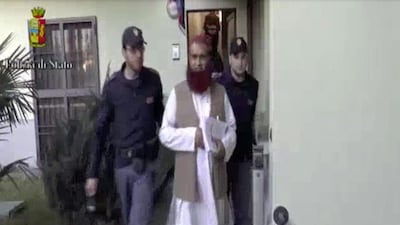ROME // Italian police said on Friday they had dismantled a network of radical Muslims they suspect of having had ties to Osama bin Laden and being behind one of Pakistan’s deadliest bomb attacks.
A six-year investigation that began with a probe into illegal immigration, led to police on the island of Sardinia ordering the arrest of 18 people in coordinated raids across Italy.
Prosecutor Mauro Mura told a press conference in Cagliari, Sardinia that the network may also have plotted to attack the Vatican in 2010, when a man suspected of being a potential suicide bomber was in Italy.
Mario Carta, an officer in the DIGOS antiterrorism unit that carried out the investigation, acknowledged there was no firm evidence of such a conspiracy, only “strong suspicions” based on wiretapped conversations in which the suspects had spoken “in ironic terms about the pope”.
The alleged key figures in the network were Khan Sultan Wali, a shopkeeper and long-term resident of Olbia, Sardinia and an unidentified imam who carried out missionary work in Brescia and Bergamo in northern Italy, according to sketchy details provided by prosecutors at a press conference.
The arrest warrants accuse the suspects of belonging to “an organisation dedicated to transnational criminal activities inspired by Al Qaeda and other radical organisations pursuing armed struggle against the West and insurrection against the current government of Pakistan.”
Interior minister Angelino Alfano described the swoop as “an extraordinary operation” that demonstrated the efficiency of the security services.
“With one sole investigation that started in 2009 we have succeeded in not only dismantling a network of people traffickers but also (detaining) several individuals accused of conspiring with terrorist aims and others of involvement in attacks,” Mr Alfano said.
Wiretap recordings suggest two members of the network were part of bin Laden’s security detail before his slaying by US special forces in Pakistan in May 2011, according to a police statement. Others remained in contact with the late Al Qaeda leader’s relatives after his death.
Some of the men arrested or being sought are suspected of involvement in the October 2009 bombing of the Meena Bazaar in Peshawar, which left more than 100 dead and over 200 people injured.
Mr Carta said there was evidence that the attack was substantially planned and financed from Olbia and that Italy-based militants had taken part in it.
Many of the victims of the attack were women and children. At the time, the authorities blamed the Taliban for carrying out the attack in reprisal for anti-militant actions by government forces. The Taliban denied being involved.
Khan Sultan Wali is one of the leaders of the small Muslim community on Sardinia, a sleepy island that is a holiday playground for celebrities and some of the world’s richest people.
According to police, the alleged radical network was involved in smuggling Pakistani and Afghan nationals into Europe through Italy, either by securing temporary visas via contacts with corrupt businessmen or helping applicants fraudulently present themselves as victims of ethnic or religious persecution who should be granted asylum in Europe.
Funds raised from this activity as well as charity collections were allegedly sent back to radical groups in Pakistan, including Al Qaeda offshoots and the local Taliban.
* Agence France-Presse

